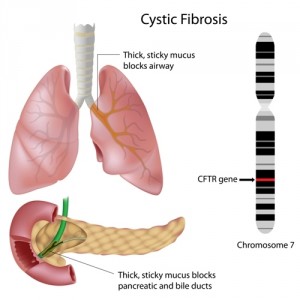Alcohol Affects a Gene Related to Cystic Fibrosis Promoting the Development of Pancreatitis

 A study led by researchers at the University of Szeged in Hungary recently revealed that excessive alcohol consumption impairs the function of the defective gene in cystic fibrosis (CF) leading to pancreatitis. The study was published in the journal Gastroenterology and is entitled “Alcohol Disrupts Levels and Function of the Cystic Fibrosis Transmembrane Conductance Regulator to Promote Development of Pancreatitis.”
A study led by researchers at the University of Szeged in Hungary recently revealed that excessive alcohol consumption impairs the function of the defective gene in cystic fibrosis (CF) leading to pancreatitis. The study was published in the journal Gastroenterology and is entitled “Alcohol Disrupts Levels and Function of the Cystic Fibrosis Transmembrane Conductance Regulator to Promote Development of Pancreatitis.”
CF is a life-threatening genetic disease in which a defective gene (cystic fibrosis transmembrane conductance regulator – CFRT) causes the body to form unusually thick, sticky mucus that can result in serious respiratory and gastrointestinal manifestations. One of these manifestations is the development of defective pancreatic insufficiency, an inflammatory condition caused by the blockade of pancreatic ducts with mucoprotein plugs and characterized by severe abdominal pain, vomiting and diarrhea. Acute pancreatitis has a high mortality rate and no specific pharmaceutical therapy. Alcohol consumption in excess can also cause acute and chronic pancreatitis. The role of the CFTR gene in the pathogenesis of alcohol-induced pancreatitis is however poorly elucidated.
In this study, healthy volunteers, CF patients and individuals admitted to the emergency department due to excessive alcohol consumption were evaluated for CFTR activity based on chloride concentrations in sweat (a defective CFTR activity causes increased chloride levels). CFTR levels were determined in pancreatic tissues and in patients with alcohol-induced pancreatitis. Pancreatic cell lines and tissues from guinea pigs and mice lacking CFTR were used to test the effects of alcohol on CFTR function and the secretion of pancreatic fluid.
[adrotate group=”1″]
Researchers found that alcoholic individuals have an increase in chloride concentrations in sweat samples, suggesting that alcohol consumption affects CFTR function. Healthy volunteers had chloride levels within the normal range. Patients with acute or chronic pancreatitis had lower levels of CFTR in their pancreatic tissues in comparison to healthy volunteers. Researchers found that alcohol inhibits pancreatic fluid secretion and CFTR activity in pancreatic ductal epithelial cells. Alcohol also reduced CFTR messenger RNA levels, the stability of CFTR at the cell surface and interfered with proper folding of the CFTR protein in both pancreatic cell lines and pancreatic tissues from guinea pigs and mice. Mice lacking CFTR were found to develop more severe pancreatitis when given alcohol.
The research team concluded that the combined results in guinea pigs, mice and humans indicate that alcohol impairs CFTR function and expression, contributing to the development of pancreatitis. The team suggests that strategies aimed at increasing CFTR levels or function could be used as a therapeutic approach in alcohol-induced pancreatitis.







